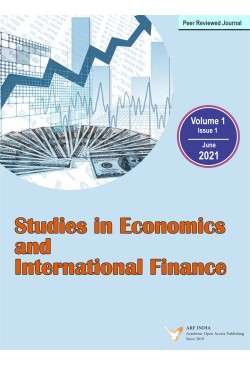The study empirically investigated the impact of commercial banks’ credit to the industrial sector on economic growth of Nigeria. Autoregressive Distributed Lag (ARDL) approach was adopted for estimation. Economic growth, proxied by gross domestic product, agricultural gross domestic product and industrial gross domestic product were regressed against the explanatory variables (Commercial banks’ credit to agriculture, industry, manufacturing and mining, quarrying and solid minerals; Government expenditure on agriculture; Agricultural credit guarantee loan; Inflation and Lending rates), thus forming three models in the study. Prominent among the findings is that significant relationship exists between Nigeria’s commercial banks’ credit and economic growth. The study further revealed that under most of the models, commercial banks’ credit key explanatory variables were statistically insignificant contrary
to apriori expectations. On the basis of these findings, the study therefore concludes that the impact of commercial banks’ credit to the Industrial on the economy is mixed and largely insignificant in Nigeria. Based on the findings, the study recommends, that as a means of monitoring commercial banks’ credit to the industrial sector, funds should b e gran ted to registered agricultur ists and industrialists on the basis of evident track records of real sector produce with a view to ensuring that misapplication and misappropriation are drastically reduced if not eradicated.
Keywords: Banks’ Credit, Real Sector, Economic Growth, Agricultural Growth, Industrial Growth ARDL Approach
Efanga, Udeme Okon, Ugwuanyi, Georgina Obinne & Ekanem, Boniface Christopher (2022). The Impact of Banks’ Credit to Industrial Sector on Economic Performance in Nigeria. Studies in Economics & International Finance, Vol. 2, No. 1, pp. 1-23. https://DOI:10.47509 /SEIF.2022.v02i01.01
